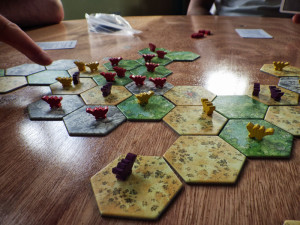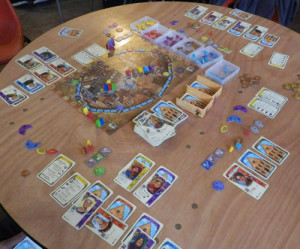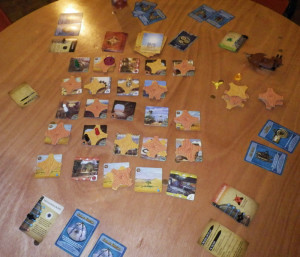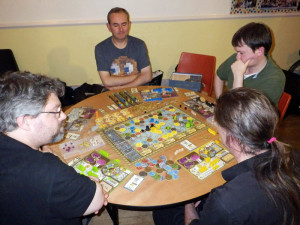(Gulp… less than five hours to go until the next Newcastle Gamers… better get cracking with logging my last visit then…)
Trias

I hadn’t heard of Trias until I saw Olly mention it in a pre-meeting Google+ post… but he tends to have pretty good taste in games, so I figured it should be worth a try
Trias is a game about continental drift. You control a species of Dinosaurs, and during each turn of the game — aside from doing stuff like moving your herds around and making dino-babies — you get to move a chunk of Pangeal (pretty sure that’s not a real word, but it should be) land-mass around and re-shape the continents. The object of the game is to end up in a situation where your species dominates the biggest landmasses.
It’s a fun game, with some interesting tactics involved… the rules regarding which chunks of land can move (and where they’re allowed to move to) actually made it a tiny, tiny bit Hive-like at times. Good stuff. I enjoyed it.
Bruges

Hot off the printing press: the brand-new English edition of Bruges — the latest Stefan Feld game — in which you play the part of a… well, I’m not entirely sure what you’re doing, really; it seems that they don’t bother putting a lot of scene-setting text in Hans im Gluck games any more. I guess Eurogame players are pretty well trained by now to assume that unless instructed otherwise, they’re some kind of medieval nobleperson attempting to gain reputation and prestige (AKA victory points…) by doing a variety of vaguely-interconnected point-gaining stuff.
This time around, said reputation and prestige is achieved by building chunks of the city of Bruge. You have a couple of canals to complete, houses to build, and people to house — all of which give you victory points. Meanwhile you need to reduce the risk of fire, floods, plague, raiders, and treachery upon your property (and person) … and try to make enough money to buy your way up the reputation ladder each turn. It’s a fairly typical Feld game… it dangles point-scoring opportunities in all directions, but never quite gives you the resources you need to pursue them all.
In this particular Feldian-points-salad, your actions are driven by a rather neat card collecting mechanism … a blue card lets you hire a blue worker, or build a house using a blue worker, or gain money at a level set by the blue dice, or counter the blue threat (floods), or build a chunk of canal in a blue space… etc etc. Getting the right combination of coloured cards in your hand to carry out your desired plans (or, more likely, making the best of the cards you get saddled with) is the crux of the gameplay.
Bruges is a good game… if a little bewildering. In addition to using your cards for all the colour-coded actions mentioned above, each card also features a unique personality/character (165 of them in total!), with special powers and abilities, which you could choose to bring into play instead of playing the basic “colour” ability. Remember how confusing it was the first time you got dealt a hand full of occupation cards while playing a game of Agricola? Your first game of Bruges pretty much feels like that… except you get dealt 4 brand new “occupations” each and every round of the game. Eek!
But, the thing is… the occupations and minor improvements are one of my favourite aspects of Agricola, and I’m sure that once I’ve got the hang of Bruges, I’m going to really like Bruge for much the same reasons. It’s just going to take a few games to get up to speed
Bruges definitely gets a thumbs up from me. I’m not sure it quite topples Trajan in terms of the favourite-Feld-I’ve-played-so-far stakes … but it’s a very promising game. I’m looking forward to playing it more.
Forbidden Desert

It’s a bit like Forbidden Island… but different. Actually, it’s a lot better to play than Forbidden Island… playing Forbidden Island usually just makes me wish I was playing Pandemic (which is essentially the same game, but with a bit more going on), but Forbidden Desert — while coming from the same boardgame-gene pool — is very much a thing in its own right.
In Forbidden Desert, players take the role of a team of explorers seeking the remains of a flying machine left behind by a mysterious ancient civilization. Shifting sand dunes and the ever-present threat of death-through-dehydration stand between you and your objective.
Gameplay is the same sort of co-operative risk mitigation exercise as Pandemic-Island, with a similar amount of luck aiding or thwarting your progress towards victory. In this case, “thwarting” was definitely on the agenda, as all the water-granting oasis tiles clumped together at one end of the map, and the all-important clue tiles being particularly reticent about turning up until very late in the game. So we lost. Very convincingly.
Un-photographed Fillers
I’m getting my chronology a bit muddled up here, but No Thanks, 6 Nimmt and Coloretto all made an appearance during the evening.
Those first two titles are abstract card games that I keep seeing bandied about in lists of classic filler / 100-games-you-MUST-play type lists on BGG etc, but which I’d never actually had any experience of (either playing them myself, or even seeing them being played by others at Newcastle Gamer meetings) …so this month, I took the plunge and snapped up a cheap (German import) copy of each title. They had their first outings at this meeting.
No Thanks is a very straightforward push-your-luck game… each player gets an allocation of plastic chips (worth points at the end of the game), and each round a numeric card is put up for grabs. When it’s your turn, you either take the current card (which is bad, because you’re trying to avoid taking cards — especially high-value ones), or you can pay one of your chips to reduce the value of the card by one point, and pass the card-taking-responsibility onto the next player. The twist comes in the fact that once you’ve been forced to take a card, any subsequent cards that you take which are numerically adjacent to ones you already hold don’t incur further scoring penalties… so they suddenly become massively valuable to you, but are still a pain for the other players. The game seems to be all about striking a balance between getting cards which are beneficial / less harmful to yourself, and denying the other players access to cards which are beneficial to them… or, at least, not letting them get their hands on them too cheaply!
The game was new to everybody at the table, so it was difficult to judge the relative worth of the various tactics involved, and it maybe felt a bit like an experimental/learning round. Seems like it has potential though.
6 Nimmt! is another game in which you try to avoid taking cards. In this one, you get dealt a hand of 10 cards, and each round you need to play your card into one of four rows, according to a bunch of rules which I won’t explain here (they’re easy to find online if you’re interested). Whoever places the 6th card in a row takes the contents of that row into their “scoring” pile, and whoever scores lowest wins.
The “official” way to play 6 nimmt! involves several rounds, with the game ending when at least one player exceeds 66 points… though many people just seem to play the game as a single-round 10-minute filler — which is what we did. This one seemed to fall a bit flatter than No Thanks did, with a general opinion at the table of “Yeah, it was OK” … though I played it with a different group of people the next day, and it was a big hit there (with demands for repeat plays)… so I guess it might be a bit of a marmite title, or a right game/wrong situation kind of thing.
And another game of Coloretto also occurred. I still didn’t win. But I’m getting better
Terra Mystica

The final game of the evening was a marathon session of Terra Mystica. Olly has posted something about this taking 5 hours… I’m not sure it was quite that long, but it was definitely a long game. Too long, really. I think the take-away lesson here is not to play a 5-player game of TM against four first-timer opponents unless you’re ready for a long session… the rules explanation alone took the best part of an hour.
I played the Mermaids (who get advantages for moving and expanding over water)… and I didn’t do very well. My failing was in the early part of the game — after explaining the importance of not being too isolated, and relying on the adjacency of opponents to get your initial civilisation up to speed, I ended up isolated and struggling to get my initial civilisation up to speed. This definitely wasn’t intentional — I dropped my initial building in the usually-busy area in the middle of the map, under the assumption that _somebody_ would end up being a close neighbour … but the initial clumps seemed to ended up concentrated at the West and South sides of the map. This made trading halls relatively expensive for me… so while I ended up placing an awful lot of dwellings at the start of the game (and got a good supply of workers to play with), I didn’t really break through into the higher-level buildings and/or a steady income of coins until round 3 or 4, by which point my growth was severely stunted.
I still enjoyed the game, but it went on for far too long — TM really wouldn’t appeal to me as much if it normally took that amount of time to get through. Previously, I don’t think I’ve had a TM game last longer than around 2.5 hours… but this was the first time I’d played with a table full of people who hadn’t played before and/or hadn’t studied the rulebook in advance, so hopefully marathons like this will be the exception, rather than the norm.
* * * * *
In summary: Another good night’s gaming! I don’t think I played a single title that I didn’t enjoy in some way (as an aside, over recent months I’ve got a bit fussier about which games I join at Newcastle Gamers, and which ones I politely decline — sometimes at the expense of waiting around for a while for something better to begin — but I think my evenings have improved massively as a result). Pick of the bunch was Bruges … I definitely need to play that again, soon. (i.e. TONIGHT!). So… see you all in a few hours, then?
CREDITS: Session pics taken by Olly. Newcastle Gamers meets on the second and last Saturday of the month. Usual cost is £3 (or £1 for concessions), but your first visit is free … check our G+ group for more info.



 Follow
Follow